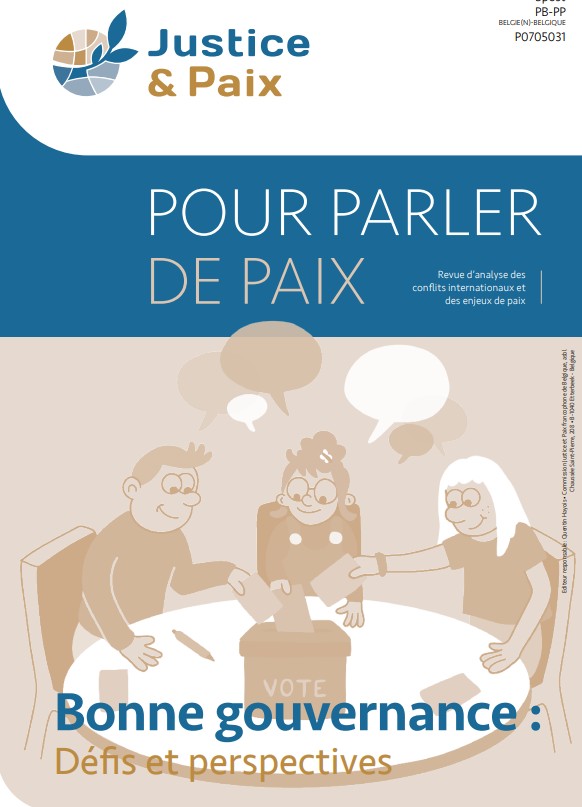Every year, new words and concepts appear: the language is continually evolving. Among these, some aim to make social struggles visible or to replace overly discriminating words with more respectful words.

“Eurocentrism”[1], “mansplaining”[2], “voluntourism”[3], or even “climate skeptic”: new words appear every year to describe new realities, to highlight social struggles or social movements.
Furthermore, other words, such as “illegal” or “disabled” are now replaced in the public space for the benefit of others, such as “undocumented” or “person with a disability”.
How do neologisms specific to certain social movements emerge? Why use other words? More broadly, can language be political?
We will see in this analysis that language is never trivial. Sometimes carrying stereotypes, sometimes serving to highlight certain lived realities, language can accentuate discrimination or combat it. The language used is an important tool for promoting peace and living together.
The performative dimension of language
For the philosopher JL Austin, language is not a neutral tool : he “acts” in the world.
Indeed, when we express ourselves, we are in fact expressing an entire system of thought, values, a political ideology, because words carry a socio-cognitive meaning which will convey a certain imagination, a perception of reality. For example, when we talk about an “expatriate” person, we rather have in mind the imagination of a white person; while the term “immigrant” refers more to a racialized person in the imagination. If either of these terms is used in a speech on immigration, it will therefore create an impact different.
In the field of sociology and anthropology, we say that language has a performative dimension, which can be defined as “the impact of words on the interlocutors”. This is developed in the work of J. Butler “ The power of words – politics of the performative ". In this work, starting from the analysis of hate speech and insults, she argues that language has the power to affect the representation that people have of themselves, threaten their lives and their very being; hence the need to measure the power of words.
The imagination conveyed by certain words will obviously depend on the context of use, as well as the historical situation. For example, the fact of using vocabulary linked to colonization and its history currently takes on a derogatory, discriminatory, paternalistic, even racist character, which it did not have during the colonial era. But words like “barbarian”, “savage”, “civilized”, etc. are sometimes still in use in the media, on the Internet, or in everyone's daily words, sometimes without us realizing what it could have meant.
Then, the fact of using a term specific to a given situation can help to reflect a very specific reality experienced by certain people, such as the term “feminicide” for example.
For all these reasons, language has a major influence on social relationships and living together.
Language as an activist tool
Due to its capacity to carry and impose imaginations, language has a potential political impact. For the writer F. Fanon , “language is a technology of power”: words are never trivial and can reinforce structures of domination or reveal them. For example, in the 1990s, the term “undocumented immigrants” emerged, whereas until then we spoke of “illegal immigrants”, which had a pejorative connotation.
Furthermore, for sociologists P. Bourdieu and L. Boltanski, language has the capacity to exist a certain experience. Certain words participate in the issues of visibility and invisibility of social struggles.
Language is therefore a resource for activists, in order to highlight certain realities.
Emergence of neologisms
Language is constantly evolving, it is never stabilized. Every year, hundreds of “neologisms”, new words, appear, depending on social and historical facts. Over the last two years, for example, we have seen the emergence of the terms “deconfine” or “antivax”, in the context of the pandemic, or “eco anxiety”, “decarbonize” and “consom’acteur”4, which crystallize concerns related to climate change.
New words can also be created or used extensively by activist movements for several purposes:
- denounce practices (such as “greenwaashing”, or “mansplaining”);
- increase the visibility of minorities (such as the term “queer”5) ;
- call for political change.
Using certain neologisms can also increase the division and polarization of opinions and present an adversary (such as the use of the term “climate skeptic”).
As an example, we can first of all take note of the workers' movement, which, confronted with the language, knowledge, and culture of the dominant classes (the bourgeoisie), demanded the fact of moving towards emancipation and winning in the power to act collectively. Through a whole series of popular institutions, a movement of linguistic reappropriation by the working classes then took place. This had the function of remaking legitimate language in the eyes of the “working class”, which contributed to their ability to defend their rights and dignity.
A second example where language is central in an activist movement is that of decolonization. On the one hand, for formerly colonized populations, it is a question of reaffirming the value of their own language and culture, in the face of the imposition of the language of the colonists which completed a colonial process of military, police and economic domination. On the other hand, certain words emerged in activist movements, in order to denounce practices that went against the decolonial idea, such as the terms “white saviorism”6 or “Eurocentrism”.
Finally, as a third example, we can talk about the feminist movement, which has also given rise to its share of new terms, such as “mansplaining” or “sexism”. The term “sexual harassment” is also a term that has emerged to highlight an experience that, in the past, was not named.
These three examples show how the battle for equal rights is accompanied by an ideological battle, but also a linguistic one. Each militant movement therefore requires a capacity for reinvention or reaffirmation of a language which carries the social interests of dominated people and allows them to regain their place in their own process of emancipation. Ultimately, it is a democratic process, which allows the problems encountered by a segment of the population to emerge.
Recovery of activist languages…which must continually reinvent themselves
There would be a semantic battle which opposes the dominant powers and the counter-powers.
Indeed, activist discourses, or “counter-discourses” will force dominant discourses to move, to include the realities supported by certain social movements.
However, it can happen that the dominant discourses speak for the people concerned, or persist in not highlighting their struggles. In this case, we will speak of a dynamic of invisibilization.
It can also happen that a dynamic of appropriation of activist languages occurs, in order to put them at the service of the dominant language. In " The new spirit of capitalism », sociologists L. Boltanski and E. Chiapello explain that capitalism uses the criticisms addressed to it for its own benefit, integrating them into the dominant discourse and putting them at its service. For example, the expression "sustainable development", which originally carried a critical charge, is today used everywhere in order to continue to develop economic activity, while boasting of preserving the planet.
Activist movements must therefore always rework their discourse, in order to continue to make lived realities visible. This is how the term “greenwashing” emerged, for example, in order to denounce this reappropriation of sustainable development by the contemporary economy.
Avenues for making activist languages visible
For citizens, it is necessary to learn about the context in which the words we use emerge, in order to become aware of the weight that this can have in living together.7.
For civil society organizations, it is interesting to work on the language used, so as not to convey stereotypes. In this context, continuing education has a central role, because it allows us to inform and equip people with an emancipatory objective. It is also interesting to carry out intellectual work on the deconstruction of the dominant language and the revalorization of the dominated language through journals, books, training, courses, conferences, debates, or even the promotion of multiple forms of cultural expression and popular (songs, rap, popular theater, etc.).
Then, steps can also be taken at the political advocacy level. Let us think for example of the law which has just been adopted last June 29 on femicide, and which now allows this concept to legally exist.
It is also and above all about preserving and creating spaces for debate and exchange, so that citizens can exchange, discuss and act. In short, to be able to continue to highlight experiences, deconstruct stereotypes and promote peace and living together.
Sarah Verriest.
[1] Ideology or practice, conscious or not, of considering European (and more generally, Western) concerns, cultures and values as universal.
[2] Explanation made by a man to a woman on what she should or should not do out of condescension based on the simple fact that the latter is a woman.
[3] Form of alternative tourism consisting of offering its services to disadvantaged populations during a stay abroad
4 Consumer who, through his purchasing choices, intends to influence the producers' offer and thus become a real market player, with the particular aim of saving the planet.
5 A person whose sexual orientation or identity does not correspond to dominant models.
6 Having a white person help a non-white person in a way that flatters their ego.
7 See on this subject:
–Glossary of decolonial terms, from the CNCD
–The words of counter-power. Little feminist, anti-racist and activist dictionary, from Feminist Yourself.
–Dictionary of dominations, of Manouchian Collective, Jessy Cormont, Said Bouamama, Yvon Fotia





